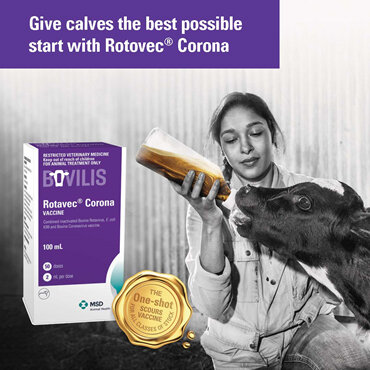Franklin Vets
Franklin Vets - excellence in veterinary care for dairy, farming, lifestyle, equine and household pets. BESTPRACTICE ACCREDITED NZ.
Your account is powered by Storbie. To edit your profile visit my.storbie.com
Your account is powered by Storbie. To edit your profile visit my.storbie.com

The most important factor in keeping calves healthy is ensuring they all receive 4-6 litres of clean, good quality, first-milking colostrum within 12 hours of birth, and that they continue to receive at least 4 litres of clean colostrum (collected from the cow at her first milking after calving) and/or transition milk (collected from the cow at her 2nd – 8th milkings) each day for at least the first two weeks of life (1).
By vaccinating your heifers and cows with Rotavec® Corona 3-12 weeks before they calve, you boost the antibodies in their colostrum and transition milk against three of the most common scours-causing pathogens. With one shot, this best-practice scours vaccine stimulates the cow to make extra antibodies against rotavirus, coronavirus and E. coli K99, which she then passes into her colostrum and milk for 28 days after calving.(2) Scours pathogens are present on most farms in New Zealand (3), so calves need all the antibodies they can get! Alongside good hygiene, housing and colostrum management, Rotavec Corona will reduce the risk of your calves getting scours, and will reduce the severity of any cases you do see.(4)
In addition to ordering your Rotavec Corona, now’s also the time to start planning how you’ll manage colostrum and calf shed hygiene during calving, and to make an emergency plan which you can easily kick into gear at the first sign of a scours outbreak.
For example, you can set aside a ‘sick’ calf pen and get a dedicated feeder and tuber that you will only use for sick calves. You can review your equipment cleaning protocols, to make sure calf feeders, tubers and calf milk storage receptacles stay as clean as possible. Check that all your colostrum storage buckets/barrels have lids so that dirt, muck and flies can’t contaminate colostrum between collection and feeding. You can also fit-out your calf sheds with solid partitions between pens, which will help contain a scours outbreak by limiting the number of calves, which have direct contact with one another. You might find the calf health videos and fact sheets available at www.topfarmers.co.nz useful as you plan.
And, of course, we’re here to help. Give your local Franklin Vets team a ring if you want a hand checking over your calf treatment and colostrum management protocols. We can also help train or refresh your staff on tubing and treating calves.
Now’s the time to plan for the next crop of calves, so talk to us about steps you can take to prepare for success.
Article supplied by MSD
Franklin Vets - excellence in veterinary care for dairy, farming, lifestyle, equine and household pets. BESTPRACTICE ACCREDITED NZ.



